Description
CHAPTER ONE
INTRODUCTION
1.1 BACKGROUND TO THE STUDY
The role of the broadcasters and the broadcast media as agents of rural and national development, especially at the information dissemination level, is now generally recognized and accepted by experts and policy makers alike. What seems quite unresolved in many developing countries is how best to utilize the potentials of the broadcasters and their media to achieve developmental objectives Nwosu, 1990:119.
In Nigeria, there are three main types of media ownership; namely: government ownership, private ownership and partnership. In the case of government ownership, the government establishes, controls and finances the media outfit, private ownership is when an individual or a group of persons establish, control and finance the media outfit, in partnership, both the government and private individuals are into some sort of coownership regarding the establishment, financing and controlling of the media house.
There is a symbiotic relationship between the media and the society. It is in the interest of the society to have strong and robust mass media as it is in the best interest of the media to uphold the values and protect the interest of the society from which they derive their impulse, support and patronage. No media institution can survive if it is perceived to be working against its own society. Onukaba, 2005:3.
It is the duty of any media institution to keep the public aware of what is going on around them by providing accurate, factual and timely information at all times, it is also the duty of the media to warn or alert the public about impending danger, to interpret events or provide information needed by the public to make every day decisions or that will make them participate actively in the political, economic and social activities of a community; and to assist the public in determining current trends and making sense of our increasing complex world. Media institutions are also expected to use their products to educate, entertain, mould public opinions, reinforce attitudes and set agenda for the society. In many societies, people depend on the media to be able to know where to find jobs, where to shop, where to eat out, who to vote for etc. It is safe to say that the influence of the media extends to every aspect of human life and society.
But for media institutions to be able to play these roles effectively, they are expected to uphold the values of objectivity, fairness, justice, accuracy, balance, moderation and decency. The reasons governments have often given for their involvement in the media are that the private ones cannot be trusted to faithfully uphold these benefits of the profession. They accuse them of fostering unrealistic expectations among the populace, of heightening anxieties about conditions in the country and of hate mongering etc. Of course, these are general criticisms against all media institutions, whether private or public. State media institutions are set up ostensibly to address these weaknesses of the private media as well as to bring government programmes and policies closer to the people and promote peaceful coexistence among the different groups in the societies in which they operate. But they are usually limited by their methods of operation Onukaba, 2005:5.
The battle line seems to be drawn between those who argue unflinchingly that the best way to use the broadcast as a facilitator of development in the third world is to have them owned and controlled by the government, and those that believe that the best result will be achieved by making the electronic media dominantly a private sector affair. It is on this fact that the researchers topic finds its footing, hence the comparative study of the performance of government owned and privately owned broadcasting media organization. A Study of FRCN and Raypower Radio.
Somewhere between the two extreme roles are those who belong to what seems to be more pragmatic position that government ownership and control of the media should coexist with private media ownership and that commercial broadcasting should coexist with private media to facilitate the job of broadcasters in the area of socio economic development of their nations.
The origin of the current government ownership and control of the broadcast media in Nigeria can be traced to the history, purpose and nature of colonial broadcasting services. It was mainly used for catering for the information and entertainment needs of the predominantly colonial political and educated elites in colonial Nigeria as well as the needs of the very few Nigerians educated elites Nwosu 1990: 120 121.
Nigeria has since had its independence in 1960 and has undergone many changes that make it imperative that the broadcast media should change its operations and structure to reflect the changed situations. For sure, the broadcasting system of Nigeria has changed or broaden its aims, objectives and mode of operation. But the ownership and control structures or pattern have remained basically the same.
So many reasons have been given by many Nigerian experts and policy makers for the perpetuation of the ownership and control status quo. One of such reasons is that the electro magnetic spectrum or airways are limited and should therefore be regulated by the government to ensure equity, order and fairness. It has also been argued that the role of broadcasting as an instrument of nation building or development is so important that it should not be left in the hands of private individuals or organizations.
The fear has also been expressed that because radio and television are powerful instruments of politicization, they can fall into the hands of some unscrupulous politicians, or political groups who may misuse them to gain and hold political power unfairly or propagate parochial political ideologies or ideals. There is the question of funding. Proponents of government control and ownership insist that broadcasting in Nigeria can never survive financially if it does not depend on its government for financial subventions.
It is believed in many quarters that it is the above reason given for exclusive government ownership and control broadcasting in Nigeria that kept the system unchanged until 1992. Hence many Nigerians have yielded abundant reasons in support of privatization of broadcasting.
The dominant belief of those who advocate privatization of broadcasting in Nigeria seem to be that the electronic media practitioners would render the best service when those media are operated as privately owned business or a commercial enterprise. Among the reason given for making this conclusion is that the electronic media would then be able to avoid undesirable government influence that is reflected in the fact that content of broadcast news or current affairs in todays Nigeria tend to be politically biased.
The point that some of the people make is that private ownership of broadcast media allow for healthy competition which would lead to improved services to the masses of Nigeria. Related to this service of the masses is the argument that privately owned broadcast media encourage diversity in production, programming and other areas of broadcasting.
By 1992, there was a lot of debate and protest against the monopoly of the government in broadcasting business. Thus, there were clarion calls for deregulation and decentralization of broadcast media establishment and ownership. Hence it was the contention of the people that a media system that does not suffer undue restrictions and interference from government would definitely become the best for the development democracy in the country Nwosu 1990:22.
It was not until the 24th of August 1992 that the Federal Military Government under Babangida administration promulgated decrees Number 38, which established privatization of electronic media. It was in view of this that Dr. Raymond Dopkesi established Raypower which started broadcasting in Lagos and later established Enugu Station which is one of my study focus .
It is the development that gave rise to the contention as to which system of ownership is preferable. Hence, the relevance of the study at hand.
STATEMENT OF THE RESEARCH PROBLEM
Ownership of the media house, its control and recruitment of its principal staff have formed the influential factors consequent upon the programme quality of the media house since the owners of the media house usually determine the aforementioned factor. The media ownership have in some ways influenced the media programmes and this has posed problems to journalism as a trade.
In this case, the broadcast media have to function in tune with the whims and caprices of the owners. Nothing runs the broadcast media practitioner down as having the option of either following the dictates of the owners or face the bitter music of being sacked. Ownership influence on programme content have made many broadcast media outfit to collapse in operations and have also made them to lose their audience grip. This is mostly true of government owned broadcast media.
After the liberation of media industry by General Ibrahim Babangidas administration in 1992, many privately owned broadcast media started springing out from all corners, one of which is Raypower Fm radio Station.
These new privately owned media stations produced standard programmes that out bids that of the government owned media stations and as a result, many people tend to abandoned government owned broadcasting media. The problem now is; why and to what extent has the majority of the citizenry abandoned government owned media
1.3 OBJECTIVES OF THE STUDY
The main objectives of the study include:
To establish whether the government owned media are free to operate in a democratic government like the privately owned media.
To check the rationale for the preference, the audience have for one medium over another.
To find out which of the media establishment is more development oriented.
To ascertain the level of ownership influence on both media outfits in terms of staffing and programming.
To establish the audience perception on both media outfits.
To compare the government owned media with privately owned media using FRCN and Raypower as study focus.
To provide veritable data for further study in this area of review.
SIGNIFICANCE OF THE STUDY
The findings of this study will help other researchers in carrying out a similar study. It will add to the mass communication literature and bulk of knowledge on media performance in Nigeria. The study will help to analyze the pattern of media ownership and its influence on Nigerian development. Finally, it will provide the premise for individuals and stakeholders to make decisions on which form of media ownership is better for Nigeria.
RESEARCH QUESTIONS
Does the emergence of private broadcasting media in Nigeria improve broadcasting generally
To what extent is the entrance of private broadcasting a challenge to government owned broadcast media in Nigeria
Does source credibility affect broadcast media listenership
To what extent do the Enugu radio listenership prefer private radio programmes to government radio programmes
To what extent does the radio listenership use what they hear from radio
RESEARCH HYPOTHESES
H1 The emergence of private broadcasting in Nigeria improve broadcasting generally.
H0 The emergence of private broadcasting in Nigeria does not improve broadcasting generally.
H2 The entrance of private broadcasting is a challenge to government owned broadcast media in Nigeria.
H0 The entrance of private broadcasting is not a challenge to government owned broadcast media in Nigeria.
H3 Source credibility affect broadcast media listenership.
H0 Source credibility does not affect broadcast media listenership.
H4 The Enugu radio listenership’s prefer private radio programs to government radio programs.
H0 The Enugu radio listenership’s prefer private radio programs to government radio programs.
H5 The radio listenership’s use what they hear from radio.
H0 The radio listenership’s do not use what they hear from radio.
DEFINITION OF TERMS
The researcher will here define some key terms in the topic. The definition will be done conceptually, that is according to dictionary and or authorities in the field, and operationally, that is as applied in the study. Some of the terms to be defined are as follows:
Comparative study
Government owned broadcasting media organization
Privately owned broadcasting media organization.
CONCEPTUAL DEFINITIONS
1. COMPARATIVE STUDY: A study on the similarity or difference. A study conducted on two or more variables /things to find out how similar or different they are Oxford Advanced Learners Dictionary 6th edition.
2. GOVERNMENT OWNED BROADCASTING MEDIA ORGANIZATION
It means radio or television owned and controlled by a group of people who control or direct the public affairs of a country or city. Oxford Advanced Learners Dictionary 6th Edition
These are the media that are owned exclusively by government of any country Ogbuoshi, 2005:28
In this situation, government exercises total control of medium or media of information. It has the right to appoint the chairman, the editors and members of the board of directors of the body Nwosu, 2004:48
3. PRIVATELY OWNED BROADCASTING MEDIA ORGANIZATION
It means radio or television owned or belonging to one particular person or group only. Oxford Advanced Learners Dictionary 6th Edition.
These are media that are owned by private individuals or group of people. Ogbuoshi, 2005: 28
It refers to the situation where individuals one person or group of persons establish, finance and direct the administration of the media organization Nnanyelugo and Agbo, 2003:35.
OPERATIONAL DEFINITIONS
1. COMPARATIVE STUDY Based on the study, it means that the researcher will study two media
Houses, that is; government owned FRCN and privately owned Raypower, to find out how similar or different they are.
2. GOVERNMENTOWNEDMEDIA ORGANIZATION
This is represented by Federal Radio Corporation of Nigeria FRCN, which is part of the researchers study focus. It is owned by the Federal Government of Nigeria.
3. PRIVATELY OWNED BROADCASTING MEDIA
It is represented by Raypower Fm, which is also part of the researchers study focus. It is owned by Raymond Dopkesi, under the corporate name: DAAR Communications.
ASSUMPTIONS OF THE STUDY
The assumptions of this study are as follow:
It is assumed that privately owned media carry more in depth news stories than that of government, it is assumed that privately owned media outfits have more qualified journalists or staff, it is assumed that privately owned media outfits air better programmes than the government owned media outfits, it is assumed that stakeholders in government owned media exert more threatening control over its staff than owners in privately owned media; finally, it is assumed that in both systems of ownership, the staff sing the song of the owners.
THE SCOPE AND DELIMITATION OF THE STUDY
The researchers scope will center on comparatively studying government ownership of media alongside privately owned media. The study focus will be on FRCN and Raypower radio stations both in Enugu.
The population selected is made up of the entire people who listen to FRCN and Raypower radio stations. But the sample size will be those in Enugu metropolis, due to time and financial constraints, and because the researcher is convinced that since FRCN and Raypower FM are both situated in Enugu, it will offer a good sample for the study.
The researcher will also experience certain delimitation in this study, ranging from the constraint of having to manage normal class activities with the research side by side, resulting to time and energy constraints to difficulty in getting permit to go out for field research survey. Also the researcher will encounter the problem of getting enough literature for the study; but above all, due to the world economic meltdown, the researcher is bound to encounter series of financial constraints, which might affect the volume of the project work on the long run.
In all, the researcher will make sure that the constraints mentioned above are managed adequately to come up with a new and worthwhile knowledge for further research in the field.
REFERENCES
Nwosu, Ikem. 2004 Mass Media and Nigerian Society. For
Mass Communication Students and Professionals, Enugu: Africa Link Books.
Nwosu, Ikechukwu ed. 1990 Mass Communication and
National Development Perspectives on the Communication Environment of Development in Nigeria. Aba: Frontier Publishers Limited.
Ogbuoshi, Linus I. 2005, Issues in Nigerian Mass Media
History. Enugu: Linco Enterprises.
Okoro, Nnanyelugo, and Agbo Ben. 2003, Writing for The
Media Society. Nsukka: Price Publishers.

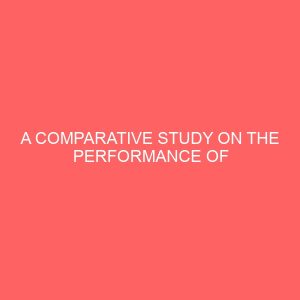
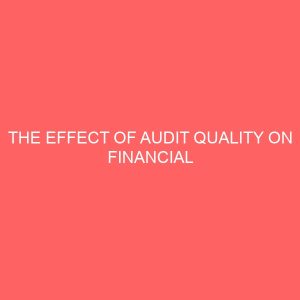


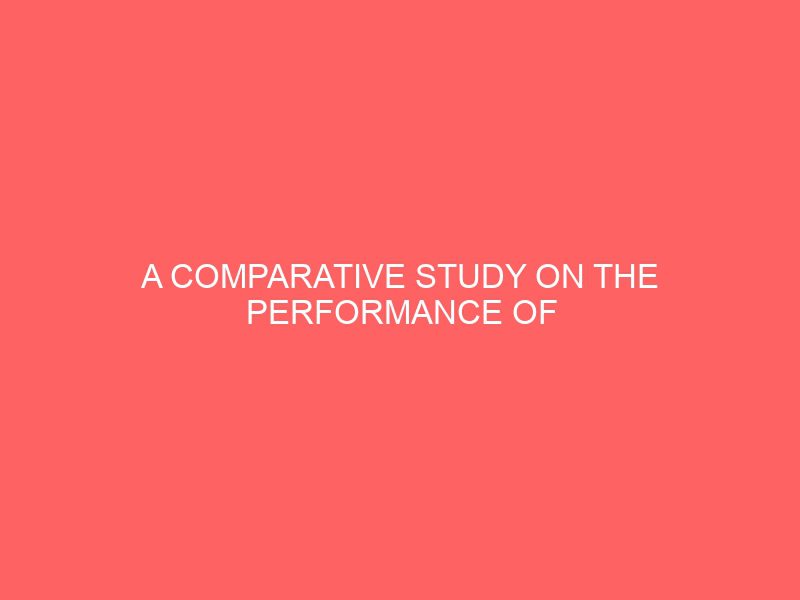
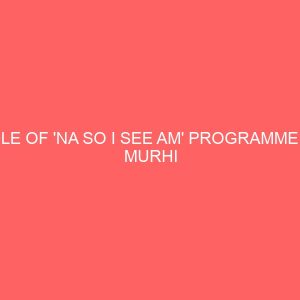
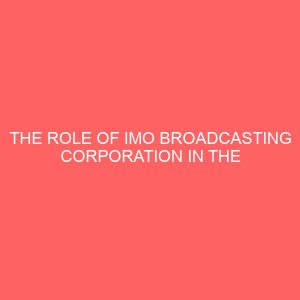
Reviews
There are no reviews yet.